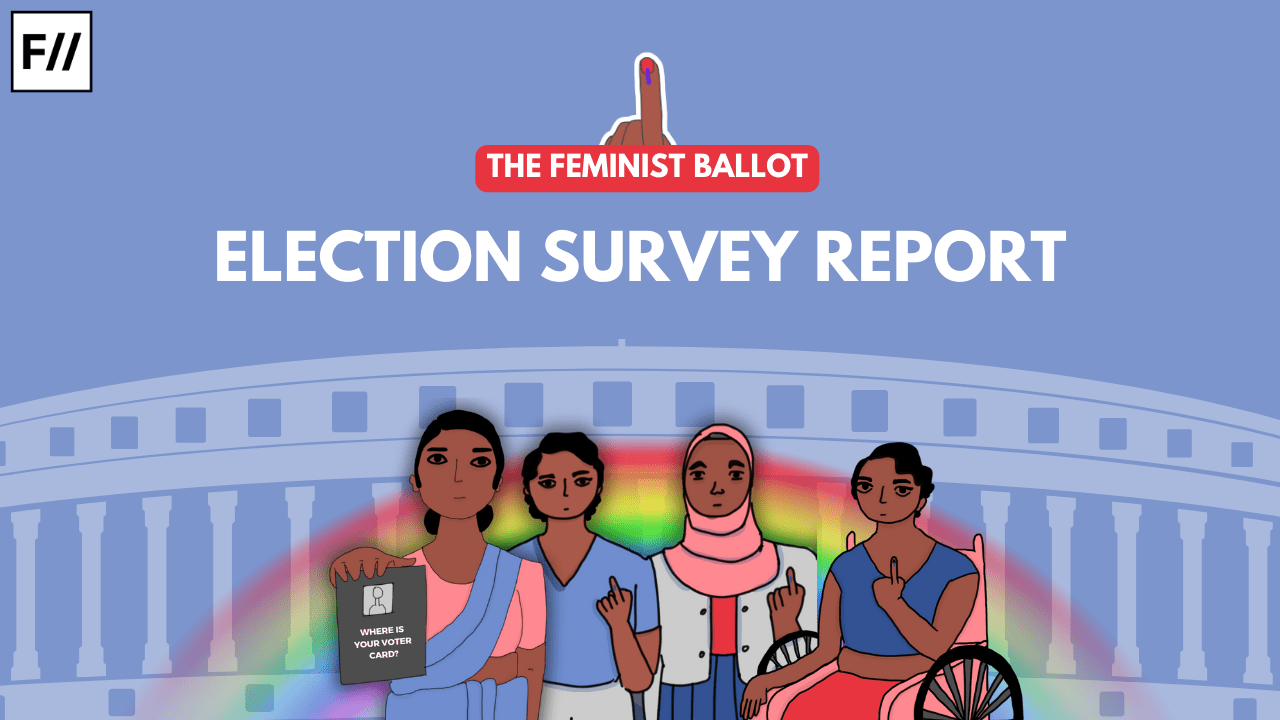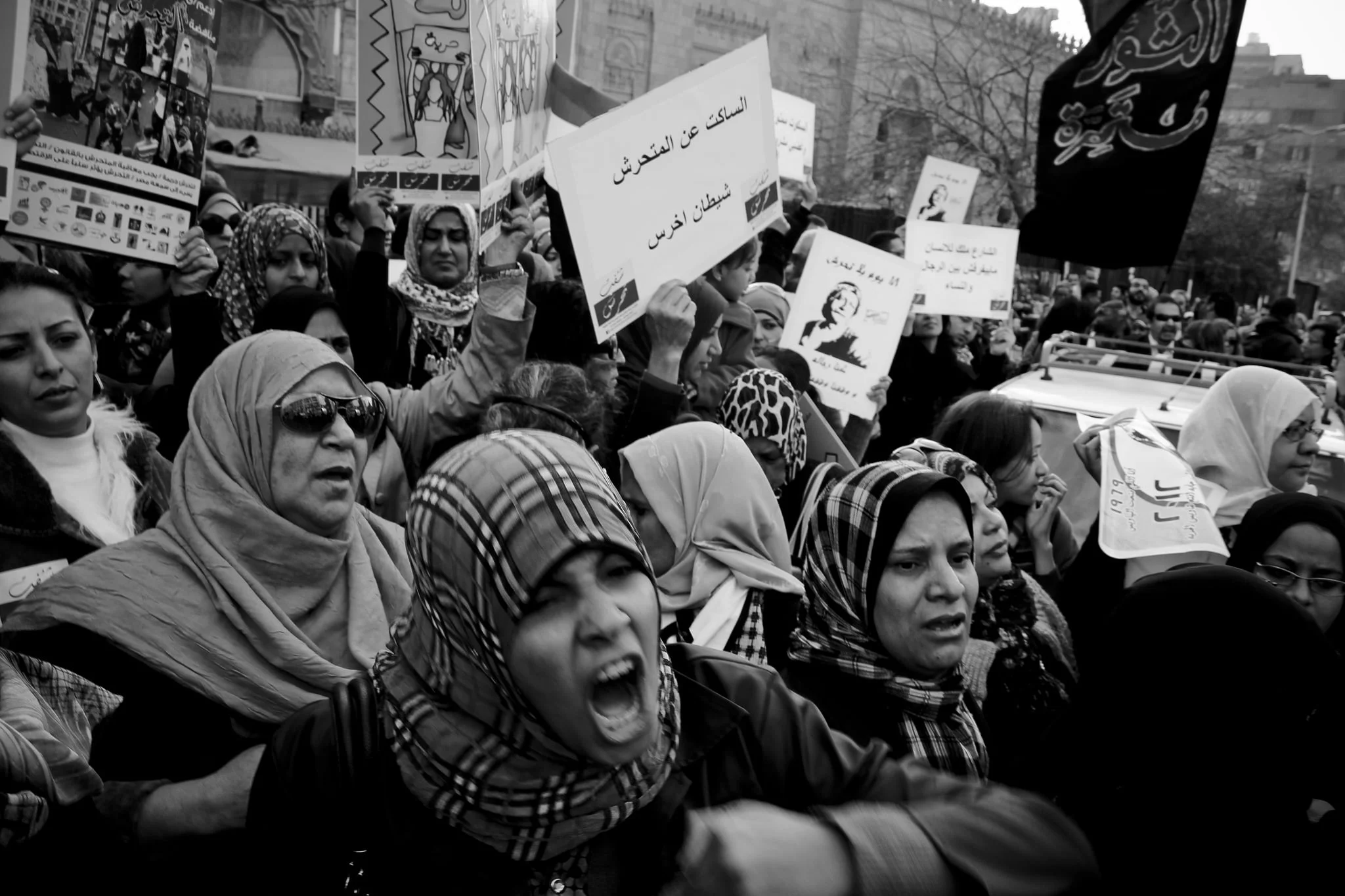The 2024 Lok Sabha elections mark a seminal point in India’s political history. Grappling with multiple factors like unemployment, inflation, corruption, gender based violence and discrimination on the basis of marginalised identity, the nation and its people are counting on this election, hoping that it changes India’s future for the better. Therefore, the 2024 elections are bound to be a deciding factor for the growth of our democracy.
However, amidst conversations around Achhe Din and Viksit Bharat, a crucial demographic lies unnoticed and under researched—women and gender minorities. This election season, FII sought to ask women and queer people how they perceive this ‘celebration of democracy’ and what expectations they hold from the current and future government.
FII conducted a national survey of women and queer people, focusing on their experiences of elections, voting, and their hopes and demands from the new government.
Feminism in India conducted a national survey of women and queer people, focusing on their experiences of elections, voting, and their hopes and demands from the new government. Our survey aimed to de-centre the hyper masculine, cis-het savarna narratives around the elections in India, which are often seen as an electoral contest fought between men and for men. By prioritising narratives and opinions of women and queer individuals, our survey aims to put their experiences and needs at the forefront, propelling progressive social change.
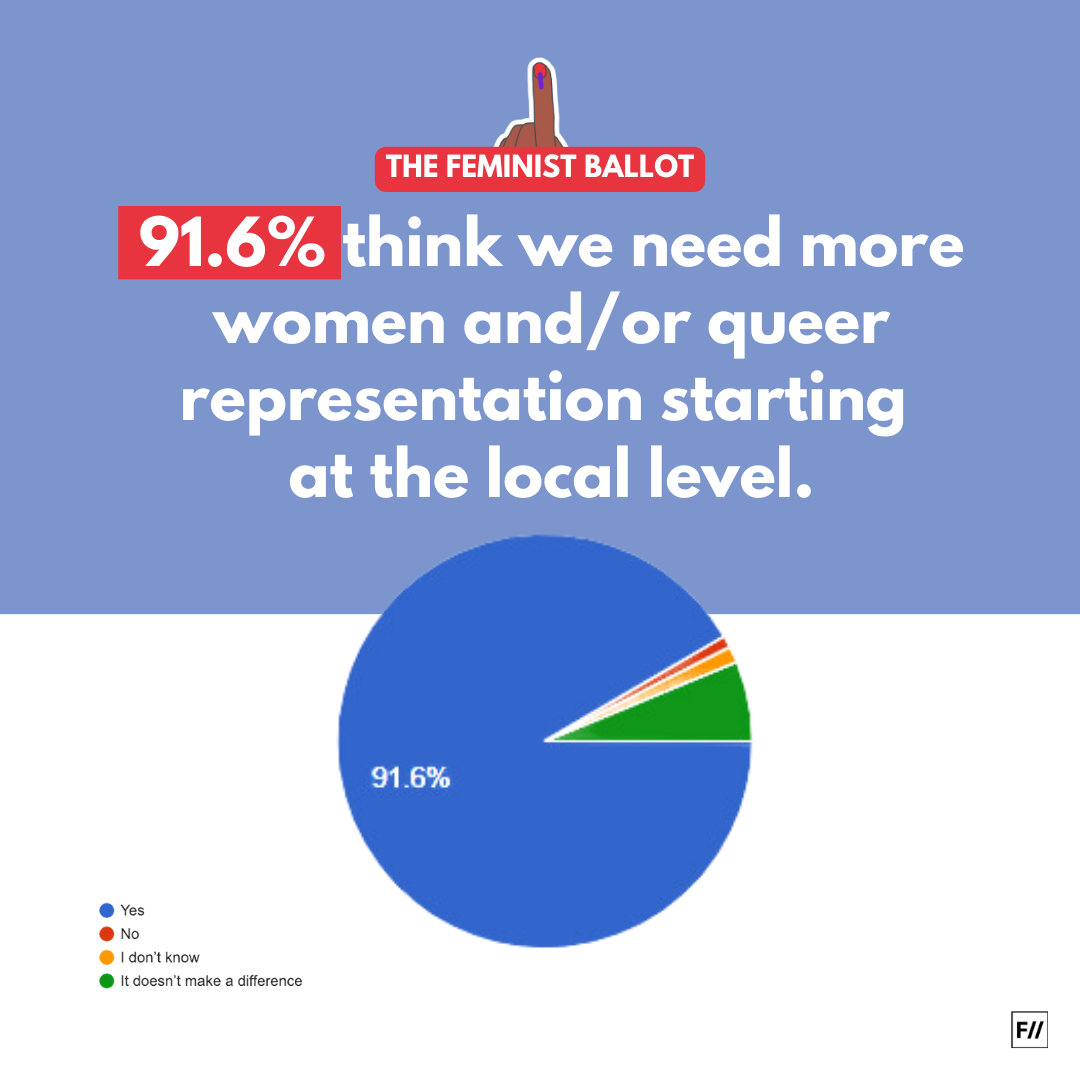
369 respondents filled in our survey. 85.4% of the respondents were women while 13% identified as non-binary and 1.6% as trans. 32.5% of the respondents were women and queer people between the ages of 18-24 while 42.3% were between 25-34. 11.9% were between 35-44; 7.3% were between 45-54 and the remaining 6% of our respondents were more than 55 years old.
While more than half (50.7%) of our respondents were Hindu and 30.4% were not believers, 8.9% of our respondents were Muslim and 6.5% of them were Christians. 54.5% of our respondents were post graduates and 29.8% had finished a bachelor’s degree. While 7.3% of them were PhD degree holders. 7% were high school graduates.
A majority of respondents (50.9% and 30.1%) were employed or students respectively. 10.8% were self-employed and 6% were unemployed.
Out of our respondents, 82.2% reported consuming news regularly, thereby establishing their awareness around current affairs which might affect their vote. 83.2% of the respondents said that they consume news digitally through mobile devices while 78.6% reported consuming news through social media. 57.5% perceive news through YouTube and 53.4% receive information through newspapers.
Democracy in India according to women and queer people
While 81.8% of our survey respondents confirmed that India is a democracy, 50.9% rated the condition of our democracy as poor and 26.8% rated the situation as worse. According to our respondents, the most important things that make a nation a democracy are the constitution, the people, the election system and the political parties.
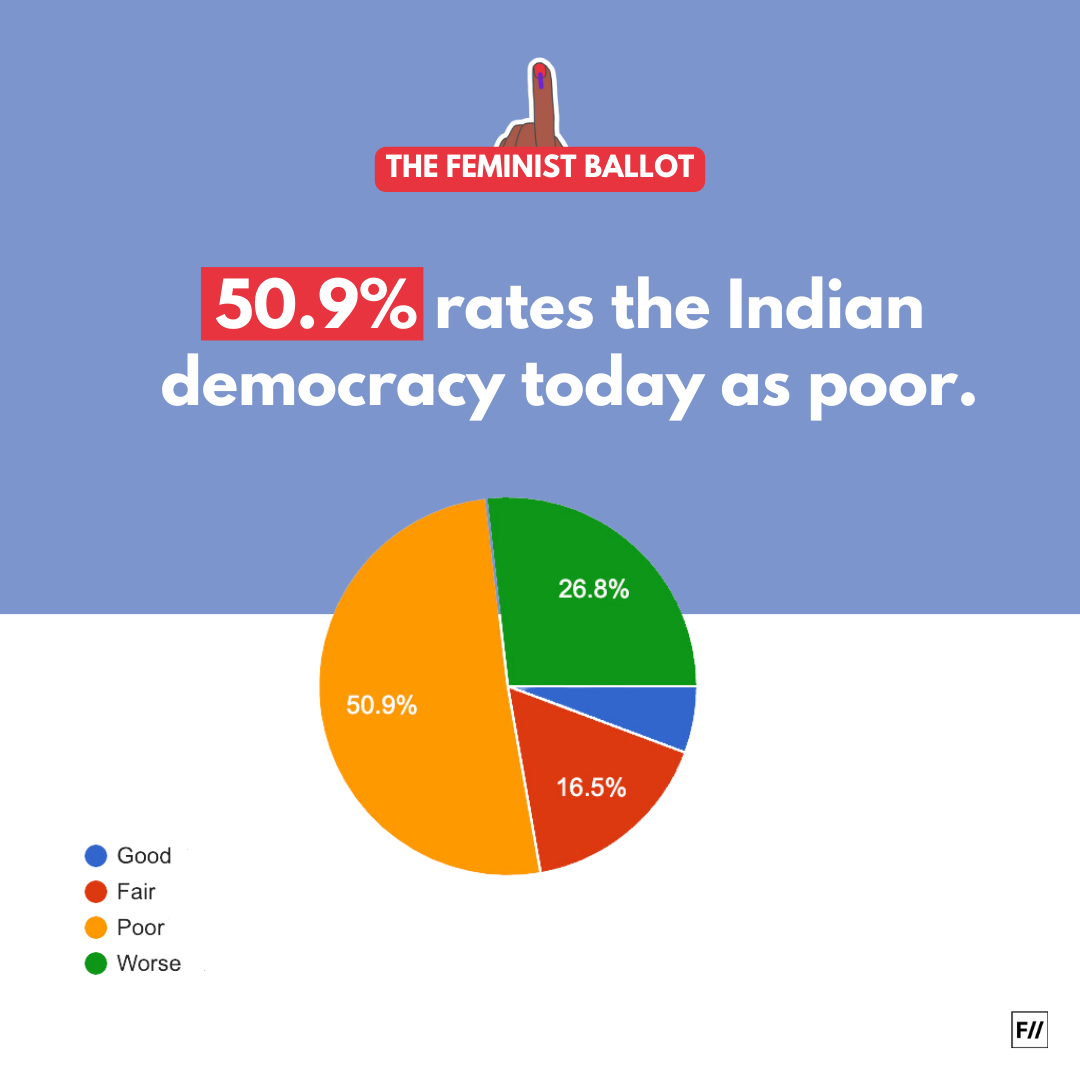
However, that the health of our democracy is dwindling is evident from the fact that 71.3% of our respondents asserted that the freedom of speech in India is declining while 18.4% of the respondents said that India does not have the freedom of speech anymore. Press Freedom is another contentious issue that is a crucial point of discussion in the Indian context at this time. With the position of the nation sliding down global press freedom indices and the government arresting journalists on sedition charges, the free press is at high risk in our nation. This was corroborated by 59.1% of our respondents while 32.8% believe that press freedom is already dead in India.
The violation of minority rights under the current government is rampant, with Muslim citizens being lynched by cow vigilantes and violence against Muslim women rising. Dalit women are being raped as the government watches silently while marginalised genders are facing state sanctioned brutality. Anti-minority laws like the NRC-CAA and the UCC are being passed, thereby undermining the ethos of our constitution which promises equality to all Indian citizens. A staggering 50.7% of our respondents think that minority rights are not being upheld as per the constitution in India, confirming that the tenets of equality in our nation are being grossly violated.
A staggering 50.7% of our respondents think that minority rights are not being upheld as per the constitution in India, confirming that the tenets of equality in our nation are being grossly violated.
In India, religious minorities are being persecuted for practising their faith despite the nation being a secular republic on paper. While some dharmic religions like Jainism and Buddhism are being engulfed by the dominant saffron dispensation of Hindutva as a part of Sanatan dharma itself, thereby erasing their uniqueness, some monotheistic religions like Islam, Christianity and Sikhism are being actively discriminated against, with their rights being curbed and their religion ostracised and slandered, what with the hijab being banned in educational institutions and Christmas being spoken of simply as a ‘Western import’. The Sikh community which has been actively protesting against the Farm laws is being labelled as separatists and khalistanis. The overarching religion and culture at this time in India seems to be a radical, rabid version of Hinduism, known as Hindutva.
59.6% of our respondents believe that religious freedom in India is declining while 26% believe there isn’t any religious freedom left in the nation anymore.
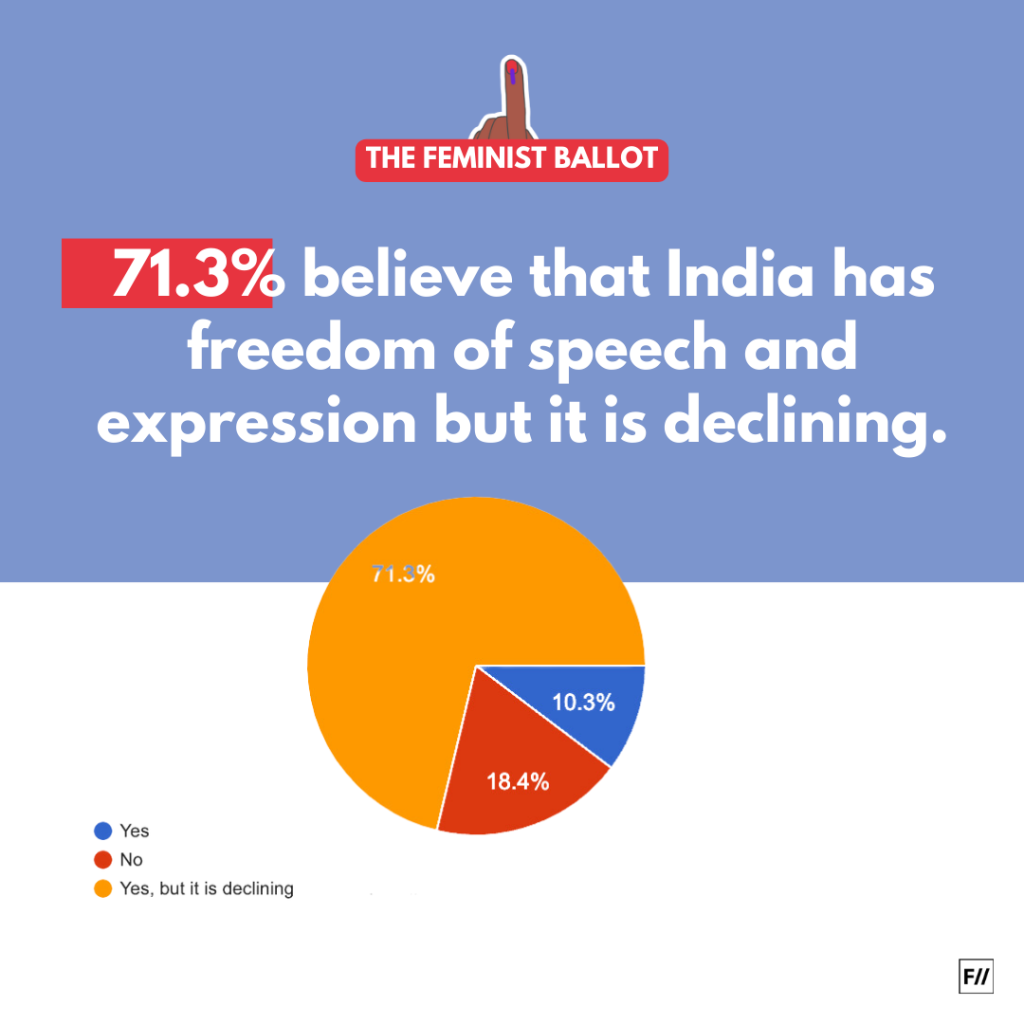
The freedom to publicly express one’s political view whether online or offline is being constantly infringed upon in India. There have been cases of late, where online or offline violence has erupted after their political thoughts were shared openly. While 35.8% of our respondents reported being uncomfortable sharing their political opinions with people outside their family and friend circles as this could endanger their safety, 18.4% of respondents reported not feeling free enough to publicly express their political views.
Recently, there have been many global reports on the decline of democracy in India from organisation like Amnesty International, Human Rights Watch and the UN. While 74.2% of respondents are up to date with what the Indian government is doing viz. policies, constitutional changes, development, the budget, the economy, taxes etc., 83.73% of our respondents have read the global reports on democracy decline in India and out of them 53.07% agree with this claim
How aware are voters of party manifestos and election campaigns?
In a democracy, elections are the most crucial national events. Elections ensure that the plurality of political opinions is kept alive in a nation like India. The preparations for the elections include publishing party manifestos and organising election campaigns. It is essential for voters to be aware of the promises and claims of a party, the ideology of their politics and the profiles of their candidates. We asked women and queer voters in India about their awareness of the elections.
While 85.9% of them were aware of the election dates in their areas, 77.2% knew who the Lok Sabha candidate for their area was and 70.2% were aware of the name of their Ward Councilor, Sarpanch, MLA or MP of their area, only 61.2% were aware of the number of Lok Sabha seats in their area. Regarding election manifestos, 85.6% of our respondents were aware of what they are, but a mere 49.6% of them had access to the last election’s manifestos. While 58.3% have read the manifesto this year, only 29% have read it in their regional language, 34.5% of them having read it in Hindi and 24.6% in English.
Women in this election: women’s participation and issues
Despite women making up 48.5% of the Indian population, the representation of women political participants in this Lok Sabha election is quite low- only 14%. This was evident from the results of our survey- out of the 37.1% of our respondents who noted having party workers visit their home for door to door campaigns, only 23.6% reported these campaigners speaking to the women in the household. Moreover, 63.3% of respondents reported seeing no women/queer party workers visit their homes for door to door campaigns. Out of the 29.7% of respondents who visited public election campaigns or meetings in their locality, less than half, 42.3% reported the presence of women and/or queer speakers at these public gatherings.
Out of the 29.7% of respondents who visited public election campaigns or meetings in their locality, less than half, 42.3% reported the presence of women and/or queer speakers at these public gatherings.
However, while women were mostly absent from these public campaigns, women’s and LGBTQIA+ issues were raised in 22.9% of these meetings. Some of these issues were education and employment for girls, women’s safety, menstrual leaves, women’s reservation bill, trans rights, gender pay gap, maternal and child care. Specific regional issues like the Manipur violence, Article 370 and Sandeshkhali were also brought up. However, in raising these issues, there was obvious tokenism. One respondent wrote, “Mostly the issues are limited to women safety and empty promises around the same. There is nothing regarding women empowerment, or employment opportunities for women, or financial independence for women; if anything, women are being made more and more dependent either upon the government for menial grants or upon the men in their families.”
First time voters in the 2024 Lok Sabha elections
First time voters are a unique demographic in every election. Since this is their first experience of exercising their democratic right and fulfilling their constitutional duty, they begin forming independent political opinion and gain the special experiences that come with living in a democracy. While 23.3% of our respondents were first time voters, 82.9% believe in the power of voting and 88.1% have voted this year.
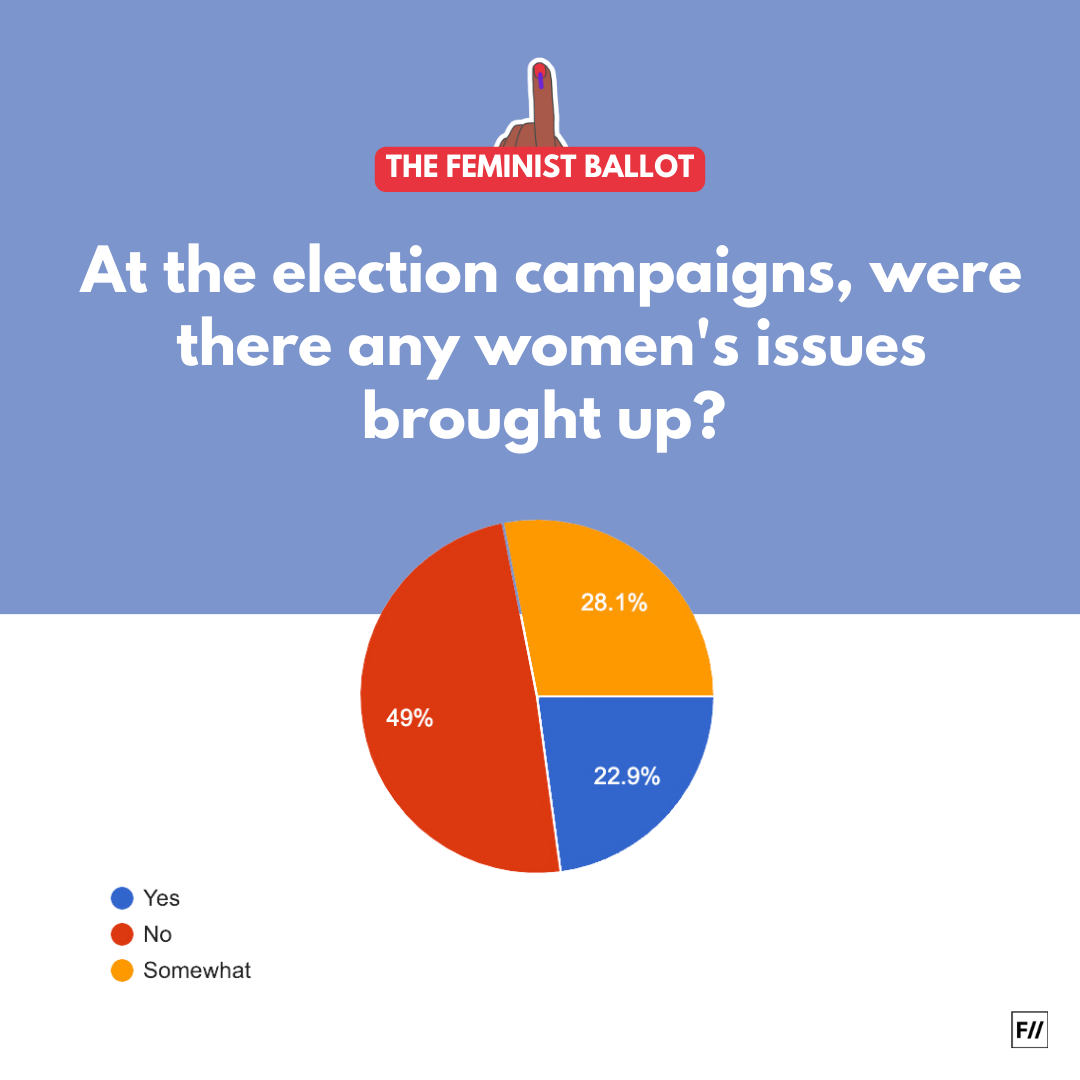
However, while it is an exciting celebration of democracy, voting can also be daunting for first time voters who are unaware of the technicalities on how to cast their vote. Ideally, attendants at the polling booth should guide these young voters on how to use an EVM machine to vote. However, 52.9% of first time voters reported not being guided by election officers on how to vote.
In order to increase voter turnout and to improve the voting experience, first time voters must be provided with proper guidance and necessary help.
Women, voting: gendered experiences of the election
Women’s voting experience is the least discussed matter in election seasons. While the political battle is laid out with great nuance by analysts, strategists and the media, very little attention is paid to the very experience of voting itself. From travelling to the polling booth to facing discrimination while voting, the unique experiences of women and queer people need to be highlighted to initiate structural change.
64% of our respondents said that the voting booth is in their neighbourhood and 25.2% said it is a bit far from their home. Even though paid voting leaves are a constitutional right for every worker, 16.9% of working women and queer respondents reported not getting any voting leaves.
41.5% of respondents reported that there were no separate waiting areas for women and children in the polling booth, thereby making it difficult for mothers to vote. While 55.3% of respondents confirmed that there were women election officers in the booth, WASH facilities for women and queer voters are still abysmal. While only 13.8% respondents confirmed the existence of clean washrooms in the voting booths, 52.6% of them reported that these washrooms were not trans/menstruator/disability friendly.
17.4% of the respondents were asked unsolicited questions about whom they voted post-vote and 23.6% were told who to vote for by male family members.
17.4% of the respondents were asked unsolicited questions about whom they voted post-vote and 23.6% were told who to vote for by male family members.
6.4% of respondents were shamed for their clothing and appearance at the polling booth. A respondent, who wore a T-shirt and jeans, was mistaken for a boy by the guard because of their short hair. They were asked to stand in a line with men. A respondent wrote that most women in their voting area wore sarees and bindis to vote. “I dressed in Western attire. I was made to feel uncomfortable.” they write. Another respondent recorded having been touched inappropriately. “The person who applied ink on my finger…held my hand for a significant amount of time which was not required in any circumstances and I didn’t like the touch on hand.“
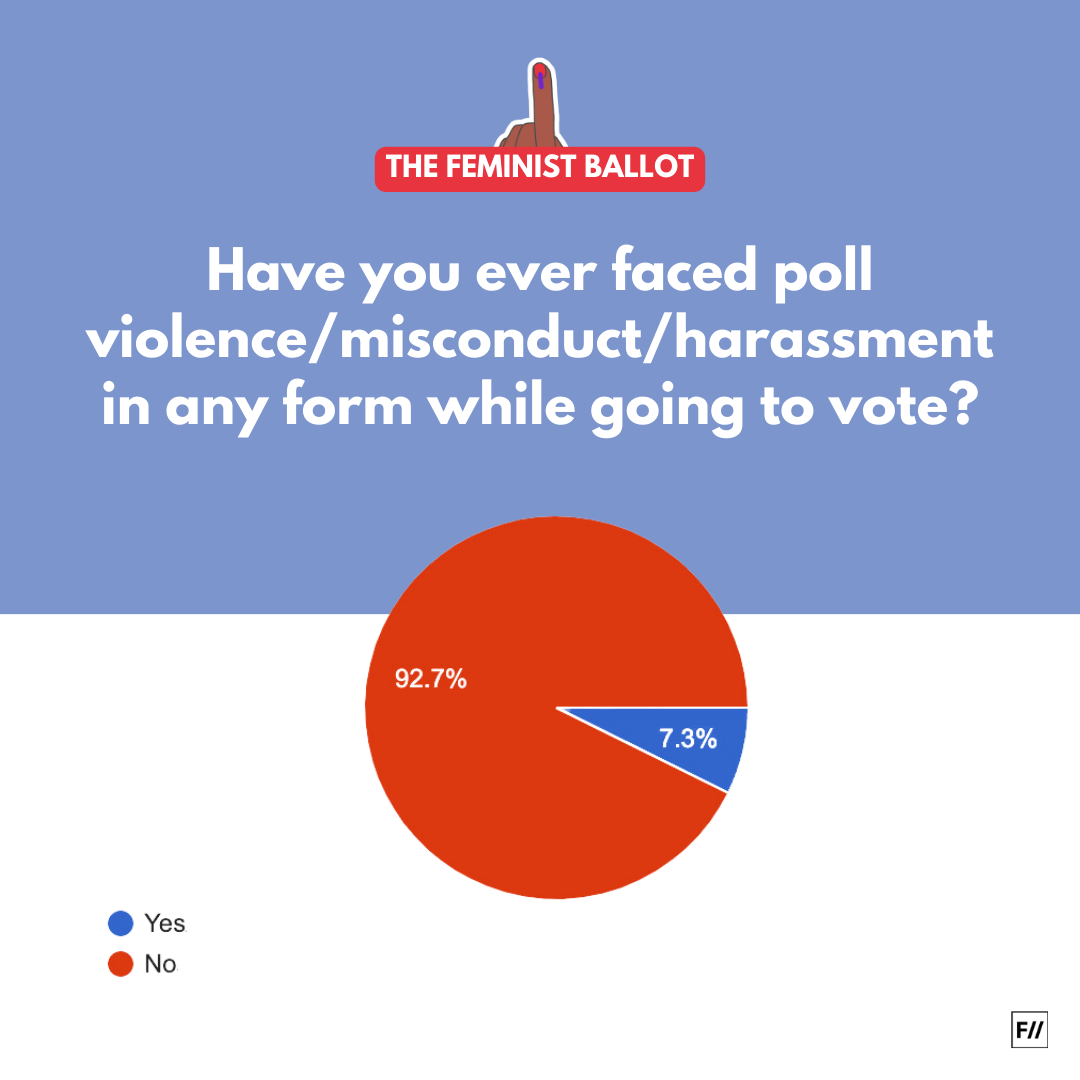
7.3% of respondents said that they had faced poll violence, misconduct or harassment while voting. One respondent wrote “Party workers/promoters from the BJP were unnecessarily crowding the location and the police personnel were letting them in without any security“. A respondent wrote that their “fingers were forcefully pressed onto one particular party button” and they were “threatened to vote for them“. A respondent who was 8 months pregnant described being discriminated against by the polling personnel who screamed at them when they asked a question.
24.1% of the respondents reported that the local police had not helped or supported in protection from harassment for the voting process.
A chunk of respondents had opted for online votes, which is a facility created for the convenience of voters. Out of the 4.3% respondents who voted online, 59.8% reported not having a proper electronic device in a non intrusive private space to vote while 8.7% reported having unstable internet connection.
37.6% of the respondents said that the voting website was not user friendly and only 25% reported that the voting website was available in their regional language while only 6.8% confirmed that the website was accessible to persons with visual disabilities.
Concerns and expectations from the new government
The biggest concerns for our respondents in their respective constituencies were—the declining state of democratic values and constitutional rights, the bad condition of civic infrastructure like roads and public spaces, discrimination against minorities and the lack of good educational institutions. The most urgent demands from the incoming government were—inclusive laws and measures for everyone, safe public spaces and transports, policies regarding climate change and jobs.
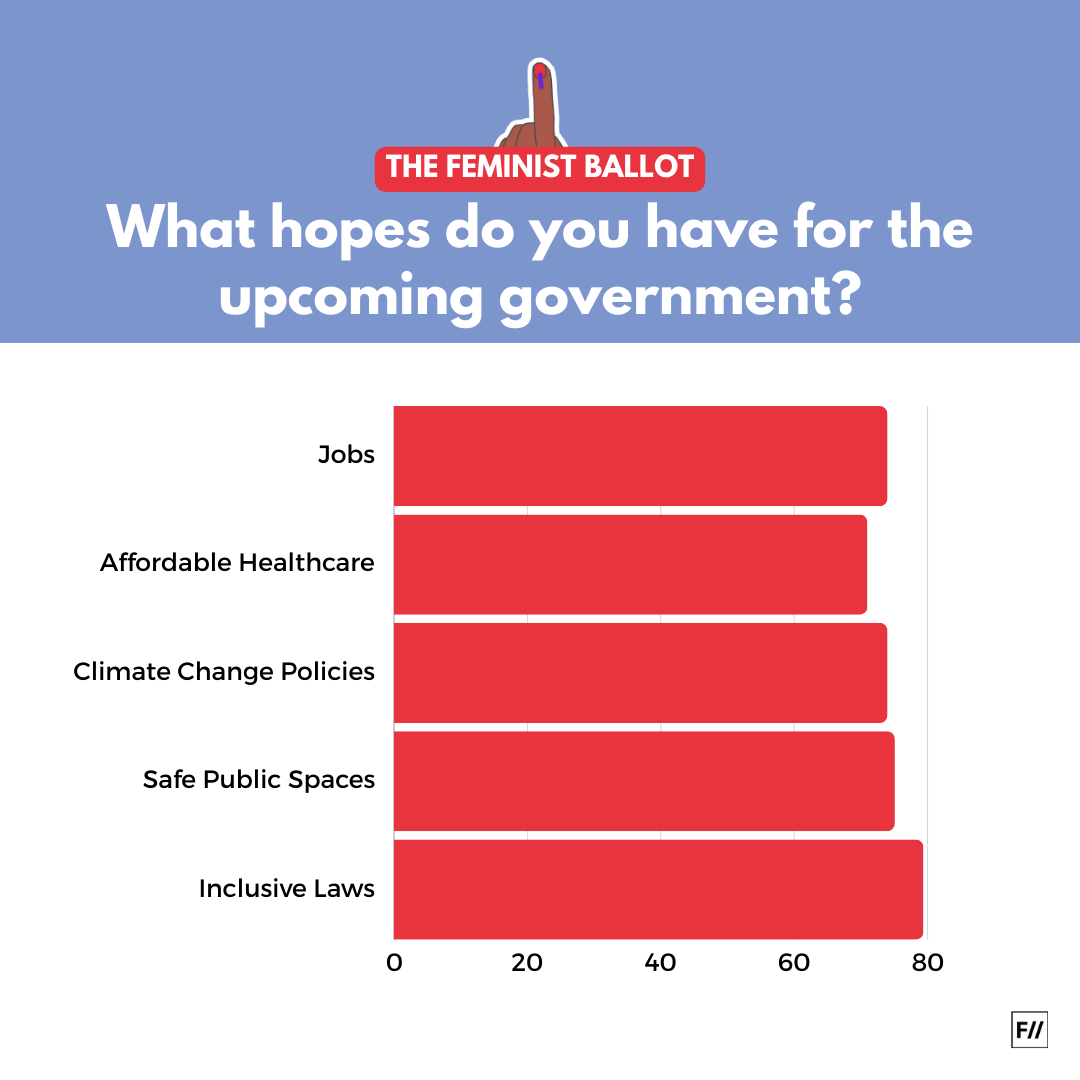
91.6% of our respondents said that they think India needs more women and queer representation in politics starting at the local level. Regarding women and queer centric laws and policies they would want, 84.1% of our respondents want to urge the government to criminalise marital rape and 81.3% want easy adoption policies for single women and queer couples, thereby radically redefining the patriarchal family structure. 79.9% respondents want marriage equality in India while 70.2% want the government to reform the Transgender Act.
When asked what they would tell their elected representative, if they were to speak to them one on one, our respondents voiced their demands. One respondent wrote, they would want the government to ‘stop killing democracy’ and ‘open (their) eyes to the real issues that continue to multiply’. From asking the government to work on the conditions of government run schools, employment issues, waste management and cleanliness, land rights and climate reforms to asking them to be faithful to the constitution, stop spreading hate and violence, not abuse their powers, stop communal hate and islamophobia and to work for the people, our respondents had a plethora of demands from the incoming government.
I would tell them a list of what I expect them to do if elected into power putting an emphasis on safety for minority communities, a caste census, safety for women especially minority women, good educational institutions and educational reforms, free health care for all particularly for tribal communities, Dalits and other minority communities.
-Respondent.
One respondent wrote, “I would tell them a list of what I expect them to do if elected into power putting an emphasis on safety for minority communities, a caste census, safety for women especially minority women, good educational institutions and educational reforms, free health care for all particularly for tribal communities, Dalits and other minority communities.” They added that they would want “Laws making marital rape illegal laws protecting the LGBTQIA+ community and making conversion therapy illegal“. Another respondent spoke out to the imagined political representative , “We vote so that we can save the constitution. Do your work saving it.“
Several respondents reported their disillusionment and dissatisfaction with the election process. “The election process itself doesn’t promote trust and confidence within people. Even the candidates are elected by exploiting a lot of divisive and often communal factors of the society. I should say that you are representatives, meant to represent the people and speak for them, and not squeeze out their resources and build prosperity in your own life,” wrote one respondent.
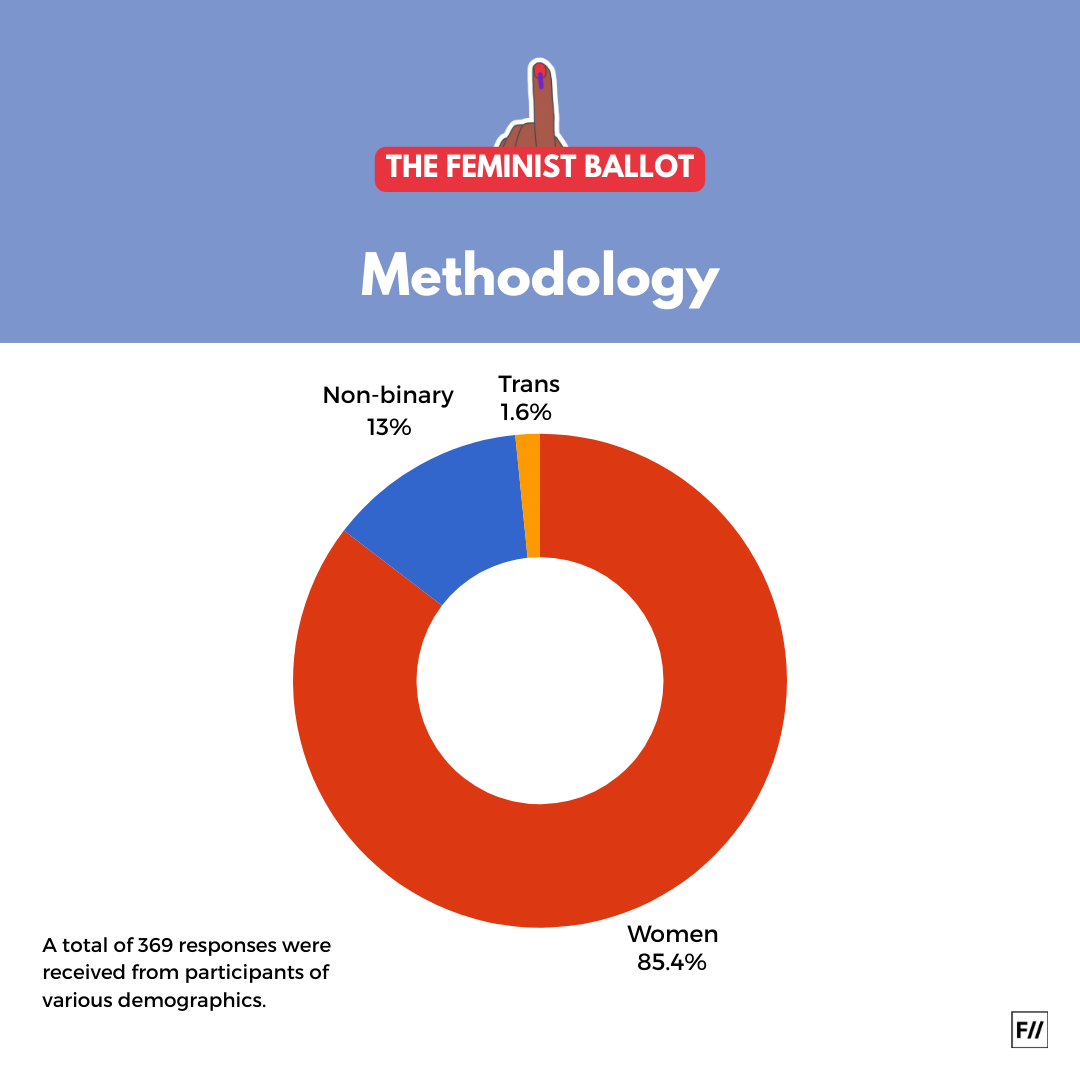
Another respondent wants to tell them “that neither of them deserves a vote if i vote after seeing them and ignoring the party politics, that their ideas lack local understanding and they don’t have any constructive plan for the constituency, that they do not uphold the spirit of constitution whenever needed and they don’t let newcomers enter politics.“
Many respondents had a lot to say about religious extremism in India. “The state you have made our country because you want to fulfill your own political motive is pathetic. The hate against certain religions, minorities, has been worse than ever. This is not what India’s democracy is about,” wrote one of them. Another respondent wants the incoming leaders “to stop the rise of religious polarisation and stop the felling of so many trees in the name of ‘development‘”.They want their leaders “to take better care of our natural resources and to start planning (their) township better. It’s set to boom and let’s make sure it’s planned out in advance.” They also want the leaders to “figure out sustainable ways to leverage rains and seawater for (their) water needs” as a resident of a coastal town.
One respondent wrote, “My ideologies are not your playground – it is not for you to dictate my ideologies, it is for you to maintain a democratic value system in your constituency and create a sense of safety and freedom for all categories of people.”
Speaking as a queer woman, a respondent wrote, “As a queer women, I would talk about the need for more women and queer representation and inclusiveness in all sectors, educating people from a young age about this and trying to break the ‘binary’ mentality of the society. Another point to discuss would be sustainable development and how my constituency is suffering the consequences of climate change and how it is essential to take measures to tackle these issues locally as well.”
FII’s The Feminist Ballot Survey has addressed a lacuna in election reporting and curating data around India’s electoral contest. By focusing on women and queer experiences of the elections, FII’s survey report becomes a crucial repository of data for research and reporting around elections and Indian democracy.
Methodology
FII conducted a survey based quantitative research focusing on women and queer individuals of voting age. The survey was divided into four sections and asked the respondents objective questions on democratic values, election campaigning, voting experience, and expectations from the new government.
About the author(s)
Feminism In India is an award-winning digital intersectional feminist media organisation to learn, educate and develop a feminist sensibility and unravel the F-word among the youth in India.
